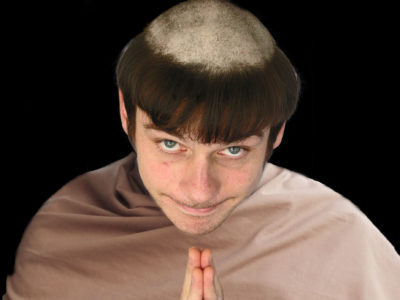COSMOS WOWED ME when it came back to TV a few weeks ago…it wowed me right up until the moment I laughed out loud when the writers clearly had not intended for anyone to laugh.
Cosmos is a show about science and the universe. The late Carl Sagan used to host it. The rebooted version is hosted by astrophysicist Neil deGrasse Tyson. One smart dude. Easy to like.
Don’t get me wrong about the laughing. When I say I laughed out loud I don’t mean to say you shouldn’t watch the show. I love it. I love science. I love learning theories about how the universe came to life.
I don’t reject science. I defer to it. When it comes to science and religion, I’m with Einstein: “Science without religion is lame, religion without science is blind.”
For a fleeting moment, I think I saw Einstein’s “lame” on Cosmos.
Dr. deGrasse Tyson was talking about a mystical experience of a Dominican friar: Giordano Bruno (1548-1600). It might have been a dream. Or a vision. Or an altered state, such as an out-of-body experience.
Whatever it was, deGrasse Tyson described Bruno as rising up high above Earth, into outer space—where he got a great look at the solar system and beyond.
Dr. deGrasse Tyson said that when Bruno came back to earth, he brought with him a new perspective on astrophysics. The friar announced that the universe was infinite and it didn’t revolve around tiny Earth. He added that there were lots of planets, and life on other planets.
Almost every scientist of the day taught that Earth was the center of the universe, and that everything revolved around our pin prick of a planet.
A rare few of the forward thinkers like Copernicus and Galileo bucked the crowd and said the sun was the center. They got in trouble for that. The church considered it heresy to teach heliocentrism—the idea that the Earth and other planets in the solar system revolve around the sun.
The Bible, after all, teaches that humans were the best part of God’s Creation. So it makes perfect sense that the rest of Creation spins around us.
It’s all about us.
An Inquisition found Galileo guilty of heresy. This particular scientist apparently came wired with a strong survival instinct. He recanted his beliefs and was allowed to live the rest of his life under house arrest.
Bruno wasn’t so lucky.
He refused to recant what he saw during his mystical experience. For that, among other charges of heresy, he got himself fried at the stake.
That’s when I laughed.
Not at the execution. But at deGrasse Tyson’s take on the matter. He said that Bruno’s science—which was right on the money, tracking with modern astrophysics—was “a lucky guess.”
Miller’s laugh track followed that line.
“Dude,” I thought. “The guy let himself get burned at the stake for a lucky guess?”
It’s hard for anyone to believe in stuff of the mystical. The invisible. The spiritual.
It seems especially hard for scientists, all brained up on their education. They put their faith in what they can see and touch and measure.
But I think there are some things at work in our world that we can’t see or touch or measure.
And it strikes me funny that people as smart as Dr. deGrasse Tyson can’t seem to acknowledge it as anything but a lucky guess.
It reminds me of something Jesus said in a prayer:
Thank you, Father, Lord of heaven and earth. You’ve concealed your ways from sophisticates and know-it-alls, but spelled them out clearly to ordinary people. Yes, Father, that’s the way you like to work.
I don’t consider myself anti-intellectual. I love learning from the scholars.
But I do think there’s something helpful that ordinary folks of faith can add to the conversation about how we got here, what we’re supposed to be doing while we’re here, and where we’re headed next.



I agree with Stephen Miller about Einstein’s statement, “Religion without science is lame, science without religion is blind”. Believers in God do not think humanity knows it all. Science can’t reveal or show us all truth or knowledge. Science is a tool of humanity, all creation is an act of God.
The late Dr. Vance Havner once said that many sophisticates are “educated beyond their intelligence”. Do you suppose that would describe Dr. deGrasse Tyson?
Hi, Gary. I don’t know Dr. deGrasse Tyson. I’ve only seen him on TV. He seems quite gifted with smarts. I’m not sure what his beliefs are about things spiritual, invisible, and unmeasurable. Many gifted with smarts are agnostic or atheist. I don’t think that makes them dumb. I think they’re missing an important part of the puzzle of life. On the other hand, many of those folks think we’re seeing only what we want to see, and putting our faith in a myth. I’m counting on them being right about astrophysics and wrong about God.
this shows why you are a best-selling, award-winning, awesome author.
Greg, my former roommate in the Holy Land, you’re either being kind or sarcastic. I welcome either from my good friend, an award-winning, two-time California photographer of the year, plus all those many awards from the Evangelical Press Association. I love your eye for the world.